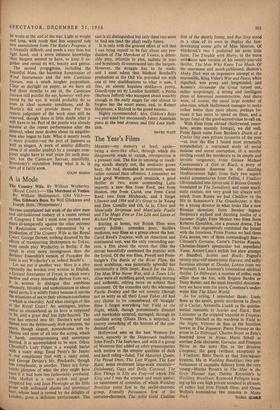A la Mode
The Country Wife. By William Wycherley. (Royal Court.)—The Merchant of Venice. By William Shakespeare. (Old Vic.) Mrs. Gibbon's Boys. By Will Glickman and Joseph Stein. (Westminster.) HAVING complained last week of the slow pace and old-fashioned tushery of a recent revival of Congreve I find I must now protest even n lore ill-temperedly against the other extreme in Restoration revival, represented by a Production of The Country Wife at the Royal Court. George Devine, nothing daunted by the effects of transporting Shakespeare to Tokyo, must needs play Wycherley in Berlin; if the result is even more incongruous than the Berliner Ensemble's version of Farquhar the fault is not Wycherley's or indeed Brecht's. Let me put it another way. Here is a play reputedly the lewdest ever written in English, a farcical forerunner of Freud, in which every Motive and every innuendo derives from sex; It is written in dialogue that combines obscenity, frivolity and sophistication in about equal parts; it is wildly funny because it carries the situations of sex to their ultimate conclusion --which is absurdity. And what emerges of this at the Royal Court? An astringent, joyless satire as emasculated as its hero is supposed to be, and 'a great deal less light-hearted. The iron has entered into Mr. Devine's soul and thence into the deliberately drab costumes, the _Pare, though elegant, monochrome sets by ?viotley and most of all into the acting, which is harsh, uncompromising and sometimes hurried. It is accomplished to be sure. Ditna Churchill's Lady Fidget is a waspish harlot with a nasty sting; Esme Percy's Sir Jasper is one complacent fool with a nasty mind, and George Devine's Mr. Pinchwife, though less complacent, is another, There arc fortu- nately glimpses of what the play might have been if it had been less fashionably produced. John Moffatt is a very stylish and good- tempered fop, and Joan Plowright as the little goose with milkmaid cheeks and provincial burr, whose head is turned by the delights of London, gives a delicious performance. The cast is all distinguished but only these two seem to find sex (and the play) really funny.
It is only with the greatest effort of will that I can bring myself to be fair about any pro- duction of The Merchant of Venice, a detest- able play, infantile in plot, sadistic in tone and hopelessly ill-constructed into the bargain. However, the struggle has to be made, and I must admit that Michael Benthall's production at the Old Vic provided me with one or two qualifications to what is now, I fear, an almost hopeless dislike—a pretty, Guardi-typc set by Loudon Sainthill; a Portia (Barbara Jefford) who scampers about amiably enough in the early stages for one almost to forgive her the court scene; and, in Robert Helpmann, a Shylock in the grand manner.
Highly recommended: Mrs. Gibbon's Boys —a pint-sized but enormously funny American piece in the best Arsenic and Old Lace tradi- tion.
DAVID WATT


































 Previous page
Previous page